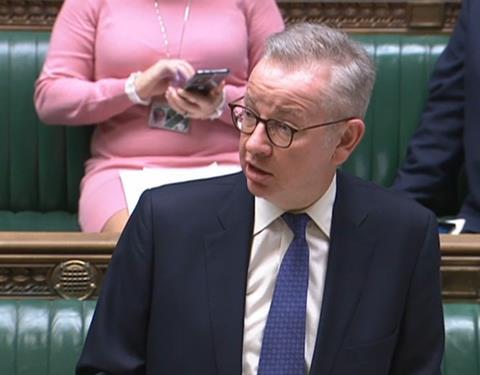Housing secretary steps up war of words with developers
The housing secretary has threatened to prevent housebuilders from trading unless they sign up to contribute to a “voluntary” £4bn fund to pay for fire safety repairs to mid-rise buildings.
The threat to UK developers goes beyond those made by Michael Gove last month, when he first announced his plan to recoup £4bn for repairs to buildings of between 11-18m in height from developers.

At the time, Gove (pictured) said he would consider using his controls over public procurement, planning powers and government funding such as Help to Buy support, to ensure developers paid in to the fund, which he put at £4bn.
Now Gove has made clear that he will consider taking steps to ensure that the “only participants in this market are those who have committed to resolving this crisis”.
The further threat is contained in a letter to “residential property developers” from a senior official at the Department for Levelling Up, Housing and Communities (DLUHC), which sets out a series of obligations which it expects housebuilders to comply with, including paying into the fund.
It says: “Those who agree to fulfil the commitments set out will continue to enjoy the benefits of the Government’s services and support on financing, procurement, planning, building control, housing investment, and industry development and leadership.
“Those who are unwilling to meet these criteria will not, and the Secretary of State has made clear he is willing to explore taking further steps to ensure the only participants in this market are those who have committed to resolving this crisis.”
>> Can Gove really ‘go after’ developers for £4bn of cladding costs?
>> Does Gove’s £4bn cladding levy mark the start of an anti-development era?
Beyond paying in to the government’s remediation fund, the letter makes clear it expects developers to also pay for all the remediation work necessary on any buildings constructed by them in the last 30 years, provide detailed data returns, and ensure senior officers in companies are checked as being “fit and proper persons to undertake major scale development”.
The letter does not make exactly who is covered by this instruction from government, but last month the government said it expected all developers with annual profits in excess of £10m to contribute to the remediation fund.
The decision to compel developers to pay into a fund came after Gove scrapped a scheme by his predecessor Robert Jenrick under which leaseholders of affected buildings would have been forced to take out loans to pay the cost of repairs.

His new threat follows speculation after his announcement that his initial threats of withdrawing funding would not necessarily be enough to make developers comply.
Housebuilders have said they support the principle of leaseholders not being asked to pay for repairs, but say they have spent around £1bn already repairing their own properties, and are already facing the introduction of the £2bn Residential Property Developer Tax to pay for high rises, and have questioned the fairness of UK housebuilders footing the bill for repairs to properties built by other untraceable or overseas developers.
The share prices of housebuilders sank in the wake of the initial announcement.
Today’s letter, signed by Richard Goodman, director general of safer and greener buildings at DLUHC, does, however, make clear the government is still determining the overall size of the contribution that it is expecting developers to make, and that it is will to negotiate how to apportion costs between participants, and how quickly the contributions must be made.
The letter does not say whether the government is open to taking into account money already spent by developers repairing their own properties in determining their contribution – a key ask from the Home Builders’ Federation. It does, however, says the government “wish[es] to ensure that those developers who are committed to making a full contribution do so on a level playing field, with a clear and transparent set of commitments that developers will be expected to make.
“We envisage that those who meet these commitments will be recognised as the responsible actors in this market.”
A draft heads of terms agreement between the government and developers attached to the letter sets out that the government expects the fund to cover the cost of carrying out remediation work to all affected buildings, the administration costs of the scheme, and reimburses any other government expenditure “for work which would, under this scheme, fall within the ambit of a Remediation Developer”.
The heads of terms states that a “float” contribution will be expected in the first year of operation of the scheme, with further annual contributions each year after. The size of the contribution will be based on “its historical profits or other market metric (to be defined)”.
Gove has said he expects a deal with housebuilders to be in place by Easter, although David O’Leary, policy director at the Home Builders’ Federation, this week told MPs that this deadline will be “extremely challenging” to meet.










No comments yet